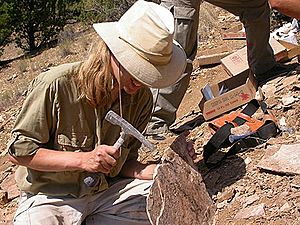Paleontology facts for kids

Palaeontology (pronounced pay-lee-on-TOL-uh-jee) is the study of ancient life on Earth. Scientists who study palaeontology are called paleontologists. They learn about living things from millions of years ago by looking at their fossils.
Palaeontology uses ideas from other sciences. These include zoology (the study of animals), botany (the study of plants), and historical geology (the study of Earth's history through rocks). Sometimes, palaeontologists also study palaeobiology. This looks at how ancient living things interacted with their environment.
Contents
What is a Fossil?
A fossil is any sign of life that is more than 10,000 years old. Fossils can be bones, shells, leaves, or even footprints. They are preserved in rocks or other materials. Palaeontologists study these fossils to understand how life has changed over time.
Fossils help us learn about creatures that lived long ago. They also show us what the Earth was like in the past. Sometimes, new fossil discoveries can change what we thought we knew about ancient life.
Branches of Palaeontology
Palaeontology is a big field with many different areas of study. Here are some of the main ones:
Palaeozoology
Palaeozoology is the study of ancient animals. Scientists in this field look at the evolution of different animal groups. They study how animals have changed and developed over millions of years. This includes everything from tiny insects to giant dinosaurs.
Vertebrate Palaeontology
This branch focuses on vertebrate animals. Vertebrates are animals with a backbone, like fish, amphibians, reptiles, birds, and mammals. Palaeontologists in this area might study dinosaur bones or the teeth of ancient mammals.
Invertebrate Palaeontology
This area studies invertebrate animals. Invertebrates are animals without a backbone. This includes creatures like shells, trilobites, and jellyfish. Many of the oldest fossils are from invertebrates.
Palaeobotany
Palaeobotany is the study of ancient plants. Palaeobotanists look at fossilized leaves, stems, seeds, and pollen. They learn about the types of plants that lived long ago. This helps us understand ancient forests and climates.
Micropalaeontology
Some palaeontologists study microorganisms. These are living things too small to see without a microscope. Micropalaeontologists look at tiny fossils like bacteria or plankton. These tiny fossils can tell us a lot about ancient oceans and environments.
How Fossils Form
Fossils usually form when an animal or plant dies and is quickly covered by sediment. This sediment can be mud, sand, or volcanic ash. Over time, more layers of sediment build up. The weight and pressure turn the sediment into rock. The original remains of the creature are slowly replaced by minerals. This process creates a fossil.
Sometimes, fossils are not the actual remains. They can be trace fossils, like footprints, burrows, or even droppings. These traces show us how ancient creatures moved and lived.
Related pages
Images for kids
-
The preparation of the fossilised bones of Europasaurus holgeri
-
Analyses using engineering techniques show that Tyrannosaurus had a devastating bite, but raise doubts about its running ability.
-
This Marrella specimen illustrates how clear and detailed the fossils from the Burgess Shale lagerstätte are
-
Cambrian trace fossils including Rusophycus, made by a trilobite
-
Climactichnites---Cambrian trackways (10–12 cm wide) from large, slug-like animals on a Cambrian tidal flat in what is now Wisconsin.
-
This wrinkled "elephant skin" texture is a trace fossil of a non-stromatolite microbial mat. The image shows the location, in the Burgsvik beds of Sweden, where the texture was first identified as evidence of a microbial mat.
-
Opabinia sparked modern interest in the Cambrian explosion
-
This illustration of an Indian elephant jaw and a mammoth jaw (top) is from Cuvier's 1796 paper on living and fossil elephants.
-
First mention of the word palæontologie, as coined in January 1822 by Henri Marie Ducrotay de Blainville in his Journal de physique.
-
Haikouichthys, from about 518 million years ago in China, may be the earliest known fish
See also
 In Spanish: Paleontología para niños
In Spanish: Paleontología para niños
 | William L. Dawson |
 | W. E. B. Du Bois |
 | Harry Belafonte |










